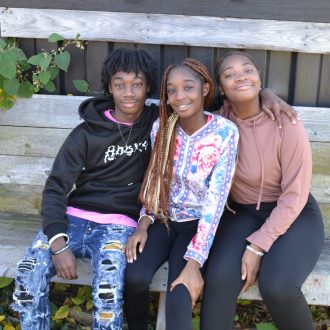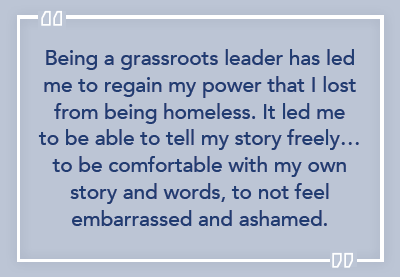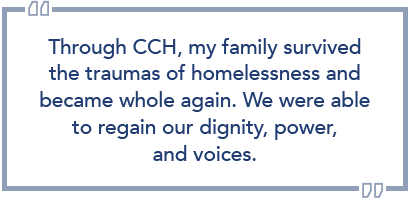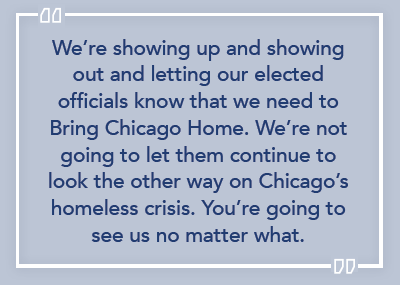
Maxica and her three school-age children moved into their new home in Chicago’s Washington Park neighborhood last January. It has six bedrooms and a big backyard – perfect for making snow angels in the winter and leaf angels in the fall. The residential streets and proximity to parks offer ample space for family strolls with their new puppy, Roxy. And a nearby community garden provides fresh produce for cooking and eating together.
DeNaysa,16, is a bookworm. The salutatorian of her 8th grade class, the now high school sophomore enjoys band, choir, and volleyball. She is also learning how to drive. DeSera, 14, is a “momma’s girl,” – a natural caregiver and straight-A honors student. She loves choir and is a sprinter on her high school’s track and field team. DeVon, 13, is a talented athlete, playing basketball, football, softball, and volleyball. He likes turning his poetry into music, using skills learned from an After School Matters program.
“My kids are my heart and soul and the centers of my life,” said Maxica.

Grateful to now be permanently housed, Maxica recognizes how far her family has come. After being diagnosed with breast cancer in 2015, Maxica experienced homelessness when the wages from her two part-time jobs were not enough to pay for both her treatments and her rent. The family ended up staying in a homeless shelter. While there, an encounter with Keith Freeman, a CCH organizer who passed away in 2021, opened up a whole new world.
“We didn’t hit it off at first,” Maxica admits. “I was coming off of a lot of pain and the basic traumas of being homeless…so I didn’t really want to hear him.”
But Keith was patient, and with time, Maxica began to listen, discovering that they actually saw eye to eye. She was intrigued to learn that elected officials are supposed to work for the people, and that CCH had led successful advocacy to improve the Chicago Public Schools’ Students in Temporary Living Situations (STLS) program, which her children were enrolled in.
“Hearing about all these wonderful things that CCH does, I needed to be a part of that,” Maxica recalled. “[Keith] said, ‘it’s about taking your story and all the pain and everything that you went through and changing those wrongs and making them right. Not just for you, but for other families, so that nobody else has to go through that again.’
“That resonated really deep with me. I never wanted another family to go through what my children and I went through,” Maxica said.
It took about six months before Maxica was ready to get involved with CCH, enough time to finish her cancer treatments and heal. But since showing up to her first meeting in fall of 2016, “I’ve been here ever since,” said Maxica with a laugh. And her children have remained along for the ride.
Together they’ve participated in the Fight for $15 and Bring Chicago Home campaigns, and written and presented their own poetry with CCH’s Horizons program. When Maxica participated in focus groups to share her experiences with receiving Temporary Assistance for Needy Families (TANF), her children were there as well, drawing pictures in an adjacent room, under the watchful eye of a CCH organizer.
“Pretty much with anything CCH, we are there as a family,” said Maxica. “We move as a unit, we move as one.”
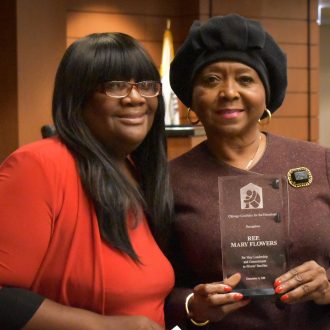
In her time with CCH, Maxica has been essential to the success of several advocacy wins.
This includes passing the Creating Opportunities for Illinoisans in Need (COIN) Act in 2018. Maxica spoke with state legislators about her challenges navigating cancer and homelessness, with only a modest TANF grant for support. By sharing her testimony, Maxica helped sway legislators to increase TANF grant levels across Illinois for the first time in a decade, providing critical support to the state’s poorest families.
“I was like, ‘I did that?’” reflected Maxica. “I was stunned for a while realizing that we can really make change.”
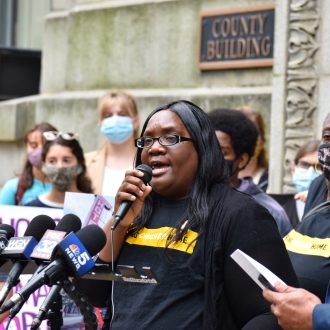
The work, and the fight for change, continues. In her time as a grassroots leader, Maxica has been an active member of CCH’s Speakers Bureau and a core leader on the Bring Chicago Home campaign. With the CPS Focus Group, Maxica successfully advocated to ensure that families experiencing homelessness had access to Wi-Fi and computers during remote learning. Around that time, DeSera, then 12, participated in a roundtable with the U.S. Secretary of Education, sharing the need for social emotional support at school. Some of her recommendations, including providing daily quiet time for students, were later enacted.
In response to the pandemic, Maxica worked with other grassroots leaders to design and implement a cash transfer program to directly support Illinoisans experiencing or at risk of homelessness. CCH’s Mutual Aid Fund continues to be managed by grassroots leaders and has dispersed 710 grants totalling $355,000 to date.
Maxica, along with four other women with lived experience, recently completed a 3-year participatory research project that examined inequities in accessing TANF in Illinois. Their research findings will inform future CCH advocacy, including an update to the COIN Act.
Today, Maxica serves as Vice President of the CCH Board of Directors while also continuing to lead advocacy as a grassroots leader. She is working towards a doctorate degree in business management, after completing her master’s. She is proud to be raising three compassionate and driven teenagers, and helping to prepare them for college and beyond. She remains grateful to the many partner organizations that helped her family get and remain housed, including Catholic Charities, Housing Opportunities for Women, and Access Living.
“It’s my pleasure to do the work that we do,” said Maxica. “If I don’t do the work and play my role, then real change cannot happen. And I know that if I’m at the table with CCH, my voice, my story, what I have to say – it means something. It matters.”
